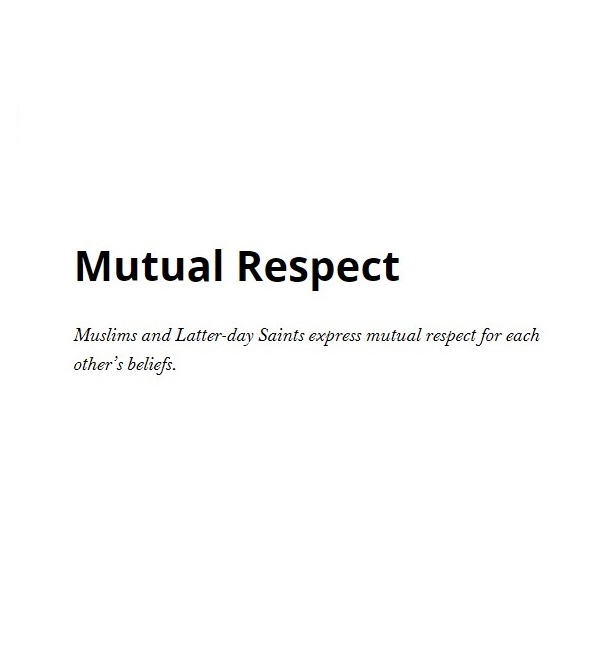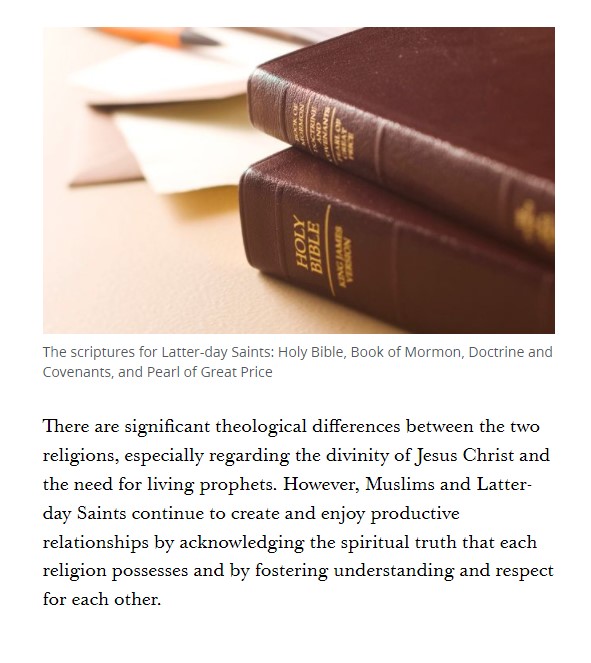In 1987, Sahar Qumsiyeh watched a classmate at Bethlehem University die after being shot by Israeli soldiers during a protest.
As a student at BYU, she watched her classmates discuss dating, grades and other things that felt unimportant to the Palestinian woman.
Now a professor of mathematics at BYU-Idaho and a member of The Church of Jesus Christ of Latter-day Saints, Qumsiyeh recalled struggling as a student in Provo because her classmates seemed unaware of the constant fear the Palestinian people live in, something Qumsiyeh could never forget. That ignorance is still in full force in her life.
“I sat by a friend of mine in church, and she was like, ‘I want you to know I support Israel with all of my heart,’” Qumsiyeh said. “I told her I don’t support Israel and I don’t think I have to, and in the end, she told me that I’m not a good member of the Church because I don’t support Israel.”
Qumsiyeh moved to Utah to attend graduate school at BYU and converted to the Church while she was a student. Qumsiyeh has had extensive experience with members of her faith making offensive comments. Although almost all members of the Church have been kind, Quimsiyeh said she believes most members are ignorant of Arab cultures.
‘A people without a land’
When Rabbi Sam Spector moved to Utah in July 2018 to lead the largest Jewish synagogue in the state, his young neighbors asked him who was “above him” in Jewish leadership. Because Judaism does not have the same leadership organization Latter-day Saints do — rabbis act as spiritual teachers and leaders, but there’s no organization above them — he told them “God.”
“They raked my leaves for me, they shoveled my driveway. My wife was like, ‘You gotta tell them you’re not the prophet.’ I was like, ‘I will in the springtime,’” Spector joked.
A Pew Research Poll found that in 2013, 82% of white evangelicals believed Israel was given to the Jewish people by God. The number is not entirely surprising. Evangelical Christians have long been vehement supporters of the establishment of a Jewish state in the Holy Land. Christians United For Israel was founded in 1975, and evangelical pastor John Hagee is using the title for his own organization.
A simplified history of Zionism begins around WWII. In a world Spector described as being “divided into two places: one where Jews couldn’t live and one where Jews couldn’t go,” many Jews grappled with the belief that they were not safe in the countries they called home. For some Jews, the solution was to search for “a land without a people for a people without a land.”
“The world was really divided into two places: one where Jews couldn’t live, and one where Jews couldn’t go.”
Rabbi Sam Spector
Eventually, this concept culminated in political Zionism. The plan was simple: Jews could return to the land of their ancestors and start their own state where they could avoid harassment. Deeply haunted by the pogroms, persecution and the Holocaust, Jews began flocking to Palestine in hopes of establishing their own government.
Political Zionism was not universally accepted by all Jews. Spector said Reform Jews and Ultra-Orthodox Jews both condemned the idea. Yet on May 14, 1948, the state of Israel was established, cementing the first Jewish state in modern history. What Zionists may have been surprised to find, however, is that the land did have a people. Although there was no government as we know them today, there were Palestinians. What followed was a heated conflict that still burns brightly.
Listen to Rabbi Sam Spector explain some of the historical nuance present in Zionism.
Israel has long held support from the United States, largely because of its Evangelical population. Evangelicals were an important part of lobbying the U.S. government in support of Israel. There is a common misunderstanding that Evangelicals believe the Jews’ return to Israel is fulfillment of biblical prophecy and that the presence of Jews in Jerusalem and the surrounding areas is a prerequisite for the Second Coming.
Christians United for Israel disputes this claim, saying no person can hasten Christ’s anticipated return. Yet the hesitation to accept this concept of Evangelical support wholeheartedly still lingers for some Jews.
“I don’t think that some of these Evangelical leaders have a particular love of Jewish people at all,” Spector said, referencing antisemitic remarks by Evangelical pastors such as Pastors John Hagee or Robert Jeffress. “I’m appreciative of the support, but there’s something about it that feels dirty.”
In 2018, Hagee and Jeffress participated in the relocation of the U.S. Embassy in Israel to Jerusalem, much to the condemnation of many, including Sen. Mitt Romney, R-Utah.
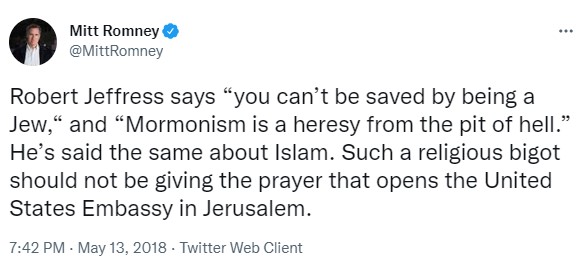
Religion as a catalyst
For Utah, a state that is 73% Christian, there are real cultural implications for that religious support. Like many Christian states, Utah votes mostly Republican. Although there has historically been bipartisan support for the Israeli government, in recent years support has wavered among Democrats. Members of Congress such as Rep. Ilhan Omar, D-Minnesota have spoken out publicly against Israeli human rights issues. Statements such as these are still viewed as controversial, even among Democrats, but they nonetheless show a slight change in left-wing views on the state of Israel. Still, most Americans think that former president Trump did not favor Israel, despite his internationally criticized choice to move the embassy in Israel to Jerusalem.
About 55% percent of Christians in Utah identify as Latter-day Saints. The faith has a unique relationship with Judaism. Latter-day Saints believe in a “gathering of Israel,” but the term refers to missionary work, spreading Christ’s gospel among the biblical twelve tribes, rather than a physical return to a specific location. Latter-day Saint beliefs also include adoption into the House of Israel through baptism.
Although some Jews like Spector do not mind the relationship, others can feel uncomfortable with the equation of Utah’s most common religion to a religion that makes up less than 1% of the population in the state.
“It doesn’t bother me so much,” the rabbi said. “Where I’ve heard Jewish people feel uncomfortable is that I’ve heard some Jewish people feel as though Latter-day Saints think they are fellow Jews and say, ‘Oh, we’re the same. We’re also from tribes of Israel.’ And for some Jewish folks it feels like appropriation of their story.”
To be in Utah is to be surrounded by ancient Israeli terminology. Drive four hours from Salt Lake and you’ll reach Zion National Park. The Jordan River winds through Salt Lake and Utah Counties. If you prefer hiking over swimming, Mount Nebo is located in the Uintah National Forest.
Within the Church, it’s even more intense. When given a patriarchal blessing, members are told which tribe of Israel they belong to, Sundays are filled with discussions on how to best gather Israel and hymns are filled with references to Church members as “children of Israel.”

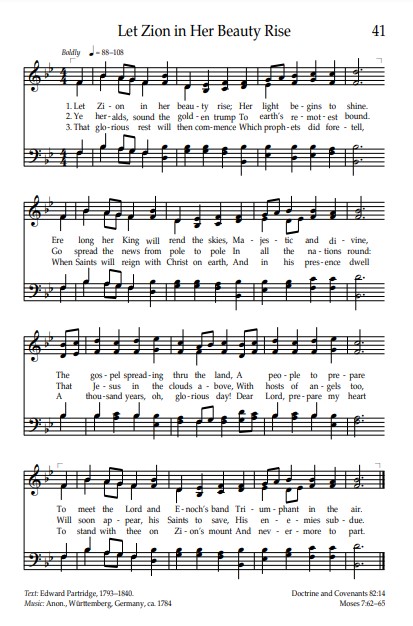
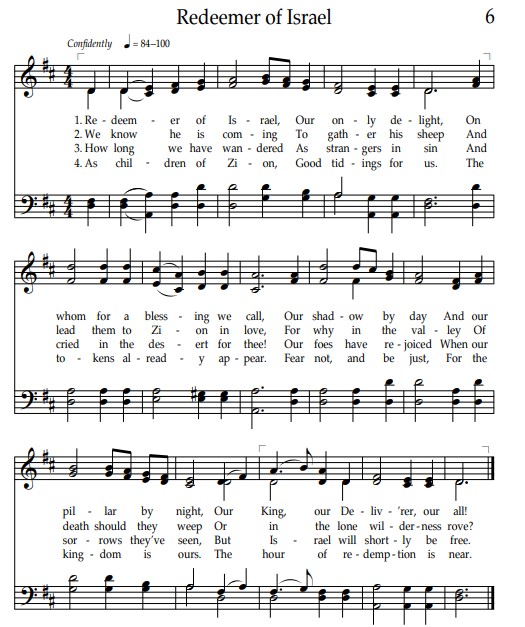
The culture combined with the lack of education means many members of the Church are not able to understand the difference between historical Israel and the state of Israel according to Jabra Ghneim, a Palestinian member of the Church and former branch president.
“What shocks me with members of our Church specifically is that we of all people should understand that the covenant with Isaac and Jacob doesn’t apply anymore. Jews rejected it,” said Ghneim. He explained that because the covenant was expanded, it no longer applies to only Jews.
“There isn’t a lot of education that separates the two in the American mind.”
Jabra Ghneim
He told a story of singing along to hymns with other Church members in Jordan. The members noticed his comfort when singing hymns about Israel and complimented his ability to respect the state despite his heritage.
He explained to the members that the Israel of the hymns is not the same as the Israeli government. Lumping together the Israeli government, the Israel of the Bible and Judaism as a whole, can lead to antisemitism and anti-Arab sentiment, he said.
“There isn’t a lot of education that separates the two in the American mind,” Ghneim said. “I had a few neighbors that would talk about Israel, would talk about Palestine and they would talk about how Israelis are bad. So Jews are bad. Which of course is not true. Of course that is not something I believe in.”
Ghneim said he dreams of one day studying with Jewish scholars but worries the conflict between Palestinians and Israelis would get in the way of being accepted into Jewish groups.
Criticism without hatred
When Church members and Americans do not understand the complexity of one of the most complicated conflicts in recent memory, they run the risk of stereotyping marginalized groups.
BYU Arabic and Islamic studies professor James Toronto said the Church wants all of God’s children to feel His love. Church leaders have taken a largely impartial stance on the conflict itself, stressing repeatedly that compassion for both groups of people in the conflict and an even-handed approach are warranted, he said.
Although some Church members like Qumsiyeh’s fellow ward-member see support of the state of Israel as necessary, Church leadership is clear that it is not necessary to support a specific policy or side to be a member of the Church.
“Church teachings have consistently affirmed that God loves all His children, that the Church does not take sides in this conflict and that Church members should seek to promote understanding and reconciliation between Palestinians and Jews,” Toronto said.
Recently, the Church released a pamphlet entitled “Muslims and Latter-day Saints: Beliefs, Values, and Lifestyles.” The pamphlet was authored with help from several imams. The Church announced the release of the pamphlet during an academic conference on Islam organized by BYU in October 2021. In several places, the pamphlet makes a point to say the relationship between Latter-day Saints and Muslims should be a kind and respectful one. The Church has repeatedly emphasized the need for the same amount of respect to be given to Jews.
